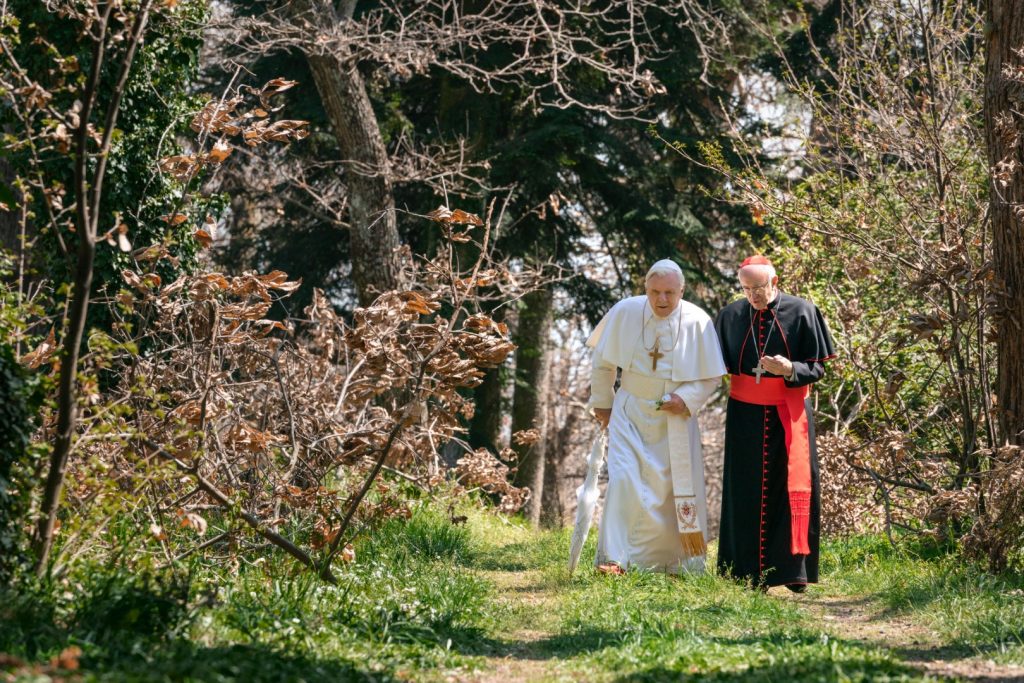Read also:
How to Watch FX Live Without CableHow To Watch AMC Without CableHow to Watch ABC Without CableHow to Watch Paramount Network Without CableFernando Meirelles explores the complexities of a church in transition in a vibrant, funny film with two divine lead performances.
“I changed,” says Cardinal Jorge Bergoglio (Jonathan Pryce) to Pope Benedict XVI (Anthony Hopkins) somewhere in the first hour of Fernando Meirelles‘ papal dramedy The Two Popes. “You compromised,” Benedict shoots back, with suitably German equivocation. But Bergoglio, years from taking the mantle of Pope from his ontological sparring partner just a few years later, responds that “change is compromise.” This conversation, set against the idyllic backdrop of the Papal summer home, is as much an exchange of ideas between two men with opposing philosophies as it is a battle for the soul of a church that needs to change in order to survive. The Two Popes manages to thread that needle with superb, if not perfect, aim and manages to be slyly funny along the way.
Based on a play by Andrew McCarten, who also adapted it for the screen, The Two Popes essentially charts the path of Bergoglio from disillusioned South American cardinal to his new role as Pope Francis, and the unlikely friendship he forged with Benedict, who would step down and become ‘pope emeritus’ in 2013 (the first Pope to do so since the 15th century). From Benedict’s ascendancy in 2005 after the death of John Paul II to the aforementioned meeting at the Papal summer home to Benedict’s eventual decision to give up the papacy, The Two Popes uses these flashpoints to give us a cross-section of the thought process that led to such a sea change in the leadership of the Catholic Church.
At first blush, the idea of a talky, two-person drama featuring two old white men about Catholicism would lend itself to stolid seriousness. But Meirelles, who also directed City of God and The Constant Gardener (plus Blindness, but we don’t talk about that one), manages to inject the proceedings with surprisingly effective elan. There’s a real Oscar-and-Felix double act dynamic between Hopkins and Pryce, Benedict the stuffy, wry incumbent, Francis the wide-eyed, modern engine of change. While it’s obviously Francis’s story at the end of the day, Hopkins provides an able scene partner for Pryce. His Benedict is delectably mischievous, whether he’s sipping Fanta during his solo dinners or being endearingly ignorant of The Beatles. (“Eleanor Rigby?” “I don’t know her.”).

But it’s Pryce’s work that carries a good portion of The Two Popes‘ vibrancy, in concert with Meirelles and DP César Charlone’s intriguing mix of handheld immediacy and awed wide shots of the Vatican. Naturally, casting Pryce as Francis makes aesthetic sense — Francis’s resemblance to the actor is old hat by now — but it’s refreshing to see how much the acclaimed actor takes to the role. Like Hopkins, he’s done prestige and populist fare alike, and his working-man’s pope lends himself to both sides of the equation. Bergoglio is a man of conviction, of deep love and belief in his vision of the Catholic Church, but he also trades barbs with Benedict with vigor and whistles “Dancing Queen” in pope’s robes. Watching these two work is clearly the film’s greatest appeal, and McCarten gives them plenty of sly, evocative dialogue to exchange. Meirelles directs these sequences with a great deal of breathing room, allowing their performances to lay the groundwork for his filmmaking (including an extremely loaded moment of tension punctuated by the ear-splitting buzz of a cricket, like a tea kettle set to boil).
But on occasion, Meirelles’ light touch threatens to soft-sell the darker chapters of both of these men’s lives, even when The Two Popes attempts to take them head-on. Francis points out Benedict’s overseeing of the church sex scandal as a steep failure for him and Catholicism, but it never interferes with their otherwise-friendly dynamic. Francis, for his part, fesses up to the controversies surrounding him — Juan Minujín plays a younger Bergoglio in flashbacks to both his calling to the church and his perceived collaboration with the military dictatorship in Argentina in the Dirty War of the 1970s — but little is resolved other than his feelings of guilt and complicity in those acts, and his attempts to make recompense with good works afterward. These issues are hardly given the depth they perhaps deserve, but as a film more concerned about the changing values of the church, diving too much deeper would perhaps be outside Meirelles’ scope.
Watching these two work is clearly the film’s greatest appeal, and McCarten gives them plenty of sly, evocative dialogue to exchange.
Despite these minor hiccups, however, The Two Popes remains a vibrant, sly dramedy about the intersection of religion and politics and power, and the responsibility those in power feel to serve their positions as best they can. As depicted here, both Benedict and Francis look to their job with the best of intentions; they’ve just got different ways of skinning this Catholic cat. Benedict’s adherence to dogma (and his complicity in coverups) isn’t the way forward for a church in a rapidly-changing world. Francis, for all his flaws, is. Call it change, call it compromise; Whatever it is, it’s sorely needed for a religion to maintain a sense of relevancy in a world that distrusts it for very good reasons.
Whether zeroing in on the complexities of religious power and how to wield it (“The most important qualification for being a leader is not wanting to be leader,” one cardinal says during the trials to elect Benedict) or letting two first-class actors share a slice o’ pizza in full Catholic regalia, The Two Popes manages to juggle its myriad tones with surprising precision. It may have the cast of a Merchant-Ivory film, but don’t mistake it for a pallid melodrama. It’s a real papal-pleaser, let’s say.